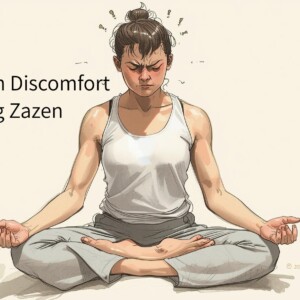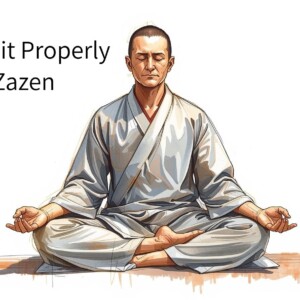
Zazen vs Mindfulness: What’s the Difference?
Introduction
Zazen and mindfulness are both forms of meditation that emphasize present-moment awareness. But while they share some common ground, they arise from different traditions and carry distinct intentions.
In this article, we’ll explore the difference between Zazen and mindfulness — in purpose, practice, and experience — so you can understand which approach best supports your journey.
What Is Mindfulness?
Mindfulness is the practice of paying attention, on purpose, in the present moment, and without judgment. It originates from early Buddhist teachings and has been widely popularized in modern wellness and psychology.
Common mindfulness practices include:
- Breath awareness
- Body scans
- Observing thoughts or sensations
- Eating, walking, or listening with full attention
Mindfulness is often used to manage stress, improve focus, and enhance emotional regulation.
What Is Zazen?
Zazen (坐禅) means “seated meditation” and is the core practice of Zen Buddhism. It involves sitting in a specific posture, observing the breath, and simply being — without trying to change or achieve anything.
Zazen is not goal-oriented. It’s not about becoming calm or mindful. It’s about letting go of striving altogether.
Typical elements of Zazen include:
- Seated stillness
- Upright posture (cosmic mudra, half-lotus, etc.)
- Awareness of breath without manipulation
- Open presence beyond concepts
Key Differences Between Zazen and Mindfulness
| Aspect | Mindfulness | Zazen |
|---|---|---|
| Origin | Theravada Buddhism / secular psychology | Zen Buddhism |
| Goal | Reduce stress, increase awareness | No goal — just sitting |
| Practice style | Often guided, structured exercises | Silent sitting, non-instructional |
| Focus | Specific object (e.g., breath, sensations) | No fixed object; awareness itself |
| Approach | Observational and intentional | Radical non-intervention, open awareness |
| Use in daily life | Often adapted to modern routines | Emphasizes full embodiment of being |
Which One Is Right for You?
- Choose mindfulness if you want a structured introduction to present-moment awareness, or are looking to manage stress and improve focus.
- Choose Zazen if you are drawn to silent stillness, simplicity, and deep philosophical roots.
Many practitioners explore both. Mindfulness can be a gateway to Zazen, and Zazen can deepen a mindfulness practice.
“Mindfulness is learning to pay attention. Zazen is learning to stop chasing.”
Conclusion: Different Doors, Same Room
Zazen and mindfulness are not in conflict. They are different expressions of the same fundamental truth: awakening is here and now.
Mindfulness helps you see more clearly. Zazen helps you let go completely.
Whether you sit to observe or simply to be — begin where you are. The present is enough.
🌿 Want to go deeper into Zen and mindful living?
Explore ZEN for LIFE — a gentle guide to bringing presence, simplicity, and calm into your everyday routine.
Now available on Kindle.
#ZENforLIFE #MindfulLiving #EverydayZen










この記事へのコメントはありません。